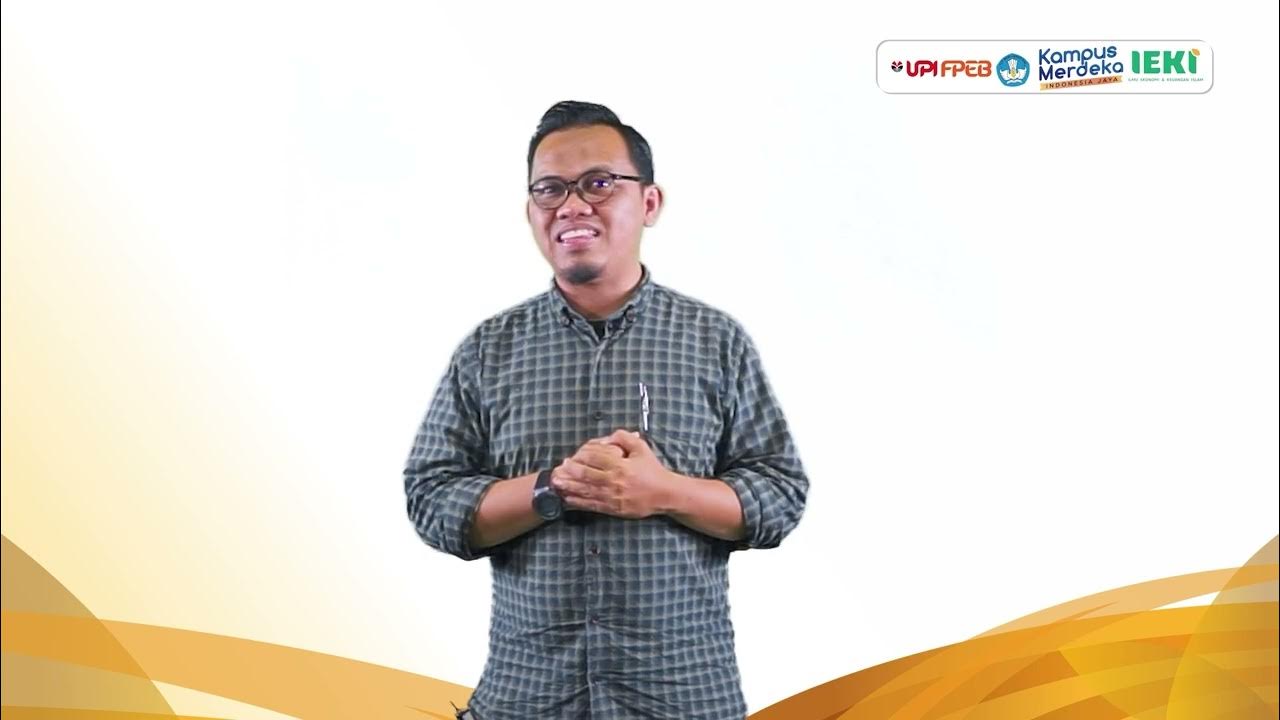Konsep Hak dan Kewajiban dalam Fikh Mu'amalah
Summary
TLDRThis video discusses the concept of ownership and possession in Islamic economics, contrasting it with capitalist and socialist models. It explores the Islamic view on individual, collective, and public ownership, emphasizing the rights granted to all humans by Allah, such as the right to life, health, and happiness. The speaker also defines 'hak' (rights) within Islamic teachings and highlights the importance of preserving essential human rights such as religion, property, lineage, and life. The talk provides insights into how Islamic economics seeks balance between individual rights and societal welfare.
Takeaways
- 😀 The discussion focuses on ownership and rights in Islamic economics, comparing it with capitalist and socialist economies.
- 😀 Islamic economics differentiates between individual, private, and collective ownership, emphasizing the moral and ethical dimensions of wealth.
- 😀 Capitalist economics is driven by the concept of individual ownership where wealth is exploited for personal gain, often ignoring moral considerations.
- 😀 Socialist economics aims to redistribute wealth among the society but has struggled to meet its goals in practice.
- 😀 Islamic economics offers a balanced approach by allowing private ownership but ensuring that wealth distribution is just and equitable.
- 😀 The concept of 'rights' in Islam, as described, refers to obligations and entitlements that are guaranteed by God, ensuring fairness for all individuals.
- 😀 Allah grants every human being basic rights such as the right to life, health, and happiness, which cannot be taken away by others.
- 😀 There are specific rights in Islam, including the protection of religion, life, property, and lineage (family). These are referred to as the five essential protections in Islamic law.
- 😀 The Quran and Hadith reinforce the idea that all human beings, regardless of their religion, have these basic rights, as they are innate and granted by God.
- 😀 In Islam, economic transactions must align with moral principles, ensuring that wealth is acquired and distributed in a manner that benefits society and adheres to ethical guidelines.
Q & A
What is the main topic of the transcript?
-The main topic of the transcript is the concept of ownership and rights in Islamic economics, and how it compares to capitalist and socialist economic systems.
How does the transcript describe the capitalist system of ownership?
-In the capitalist system, ownership is concentrated in the hands of individuals or capitalists who have the right to exploit their wealth without concern for whether their actions are halal (permissible) or haram (forbidden). This often leads to greed and unethical behavior.
What are the key differences between capitalism and socialism as discussed in the transcript?
-Capitalism emphasizes individual ownership and wealth accumulation, while socialism advocates for the collective ownership and sharing of resources. The transcript explains that socialism aimed to provide welfare for all, but it ultimately failed to achieve its goals, just as capitalism did.
What is the Islamic perspective on ownership?
-Islamic economics supports a balance of individual and communal rights to wealth and resources. It acknowledges various types of ownership, including private, communal, and public ownership, and stresses the importance of ensuring these rights are justly upheld.
How does Islam define 'hak' (rights)?
-In Islam, 'hak' refers to a right that is certain, unquestionable, and must be upheld. It is a clear and binding entitlement that is based on both the Qur'an and Hadith, and includes rights to life, health, happiness, and other basic human needs.
What are the inalienable rights of every human being according to the transcript?
-Every human being has certain inalienable rights, which include the right to life, health, a dignified life, and happiness. These rights are given by Allah and are universal for all humans, regardless of their religious beliefs.
What are the four key protections (hiz) mentioned in the transcript for every individual in Islam?
-The four key protections (hiz) in Islam are: 1) protecting one's religion (hiz din), 2) protecting one's wealth (hiz mal), 3) protecting one's lineage (hiz nasl), and 4) protecting one's life (hiz nafs). These are fundamental to ensuring an individual's rights are safeguarded.
How does the Islamic concept of ownership differ from that of capitalism?
-Islamic ownership emphasizes the importance of both individual rights and communal responsibilities, ensuring that wealth and resources are used in a way that benefits society as a whole. Unlike capitalism, which often encourages exploitation and individual gain, Islam encourages ethical behavior and social welfare.
What does the transcript say about the rights of Muslims versus non-Muslims?
-The transcript explains that all humans, regardless of being Muslim or non-Muslim, share basic rights given by Allah, such as the right to life and dignity. However, Muslims have additional specific rights that must be protected, such as those relating to their faith, wealth, lineage, and life.
What is the significance of the Qur'an and Hadith in defining rights in Islam?
-The Qur'an and Hadith serve as the foundational texts for defining rights in Islam. These texts outline clear guidelines on what constitutes a right (hak), including both spiritual and material rights. The Hadith also elaborates on the duties individuals have toward fulfilling these rights, both to Allah and to others.
Outlines

Dieser Bereich ist nur für Premium-Benutzer verfügbar. Bitte führen Sie ein Upgrade durch, um auf diesen Abschnitt zuzugreifen.
Upgrade durchführenMindmap

Dieser Bereich ist nur für Premium-Benutzer verfügbar. Bitte führen Sie ein Upgrade durch, um auf diesen Abschnitt zuzugreifen.
Upgrade durchführenKeywords

Dieser Bereich ist nur für Premium-Benutzer verfügbar. Bitte führen Sie ein Upgrade durch, um auf diesen Abschnitt zuzugreifen.
Upgrade durchführenHighlights

Dieser Bereich ist nur für Premium-Benutzer verfügbar. Bitte führen Sie ein Upgrade durch, um auf diesen Abschnitt zuzugreifen.
Upgrade durchführenTranscripts

Dieser Bereich ist nur für Premium-Benutzer verfügbar. Bitte führen Sie ein Upgrade durch, um auf diesen Abschnitt zuzugreifen.
Upgrade durchführenWeitere ähnliche Videos ansehen
5.0 / 5 (0 votes)






